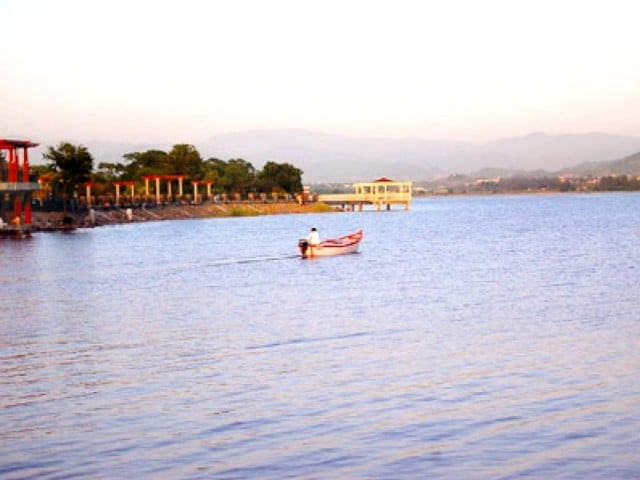64 illegal housing schemes polluting Rawal Dam water
Presently there is no treatment plant working at dam whereas it requires four

Presently there is no treatment plant working at dam whereas it requires four.
PHOTO: FILE
According to an official, the illegal housing societies had not obtained any No Objection Certificate (NOC) from the Capital Development Authority (CDA) and an environment impact assessment report from Environment Protection Agency (EPA).
The housing societies were illegal and hence had no proper sewage and sanitation system which ultimately resulted into improper disposal of waste through different tributaries and drains dumping them into Rawal Lake, said a CDA official requesting anonymity.
He said the mushroom growth of housing schemes near the jurisdiction boundaries of Murree and the federal capital and other trans-boundary areas encircling the key water reservoirs. "During extreme rainfall, household, plastic wastes and carcass of animals could be visibly seen flowing down to the tributaries, linked channels and drains," he mentioned.
Rains revive aquatic life in Rawal Dam
He informed that at present there was no water treatment plant working at Rawal Dam whereas it required four water purification plants. To a question, he said the regularisation process of illegal settlements was on the cards as the government was working on the proposal to revise the capital's master plan. He said not only illegal housing, rather poultry farms and industrial units established near Soan River out of which some were set up at deserted and far off locations and were not easily accessible.
The CDA spokesperson said the federal government had formed a committee to decide the fate of illegal settlements and would give its recommendation over the issue soon.
The long-awaited five Sewage Treatment Plants (STPs), planned to be installed in catchment areas of federal capital, may not materialise in near future due to bureaucratic hiccups and illegal settlements in and around the project designated sites, according to Metropolitan Corporation Islamabad (MCI).
The plants were to be installed at catchment areas of Bari Imam, Lower and Upper Shahdra and Simly dam might took half a year due to some technical issues to get its PC-I approved from the planning commission, official sources in the MCI told APP.
The STPs idea, floated by Islamabad Capital Territory (ICT) Administration and Cabinet Division in 2012, is aimed at stopping the flow of sewage in the streams of Murree and the Korang River which discharges into Rawal Lake.Sharing details of the project, the MCI said Rs3.69 billion PC-I had been completed and submitted to the Planning Commission (PC) for getting final nod from Executive Committee of National Economic Council (ECNEC) after clearance of some technical observations.
The PC raised some observations earlier regarding categories, capacity and capability of the plants which were responded to by the hired consultant instantly. Recently, the sources said the planning commission again sought integrated water management solution, details of PC-II of the project and current status of the illegal settlements in and around the selected sites.
The regularisation case of encroached land in these areas was in process and once the CDA t Authority declares them legal, the MCI would purchase the sites by claiming the easement right especially over water collection sites. The finances to acquire the identified sites had already been allocated in the PC-I.They also sought PC-II amounting to Rs70 million including cost of hiring consultants and conducting feasibility studies
Surprisingly, the installation of plants would be facilitating majority of Punjab citizens but the provincial government did not release 36 per cent of their share.
The sources said the CDA had made a commitment recently to kick-start the project soon after approval of the PC-1.After approval of the PC-I, they said, "We will start other procedures like pre-qualification, inviting tenders and hiring a contractor."Elaborating the plants capacity, they said the five units would purify nine million gallons contaminated water per day, giving a sigh of relief to the citizens of twin cities of Islamabad and Rawalpindi who had been expressing concerns due to supply of polluted water.
Published in The Express Tribune, December 24th, 2018.



















COMMENTS
Comments are moderated and generally will be posted if they are on-topic and not abusive.
For more information, please see our Comments FAQ